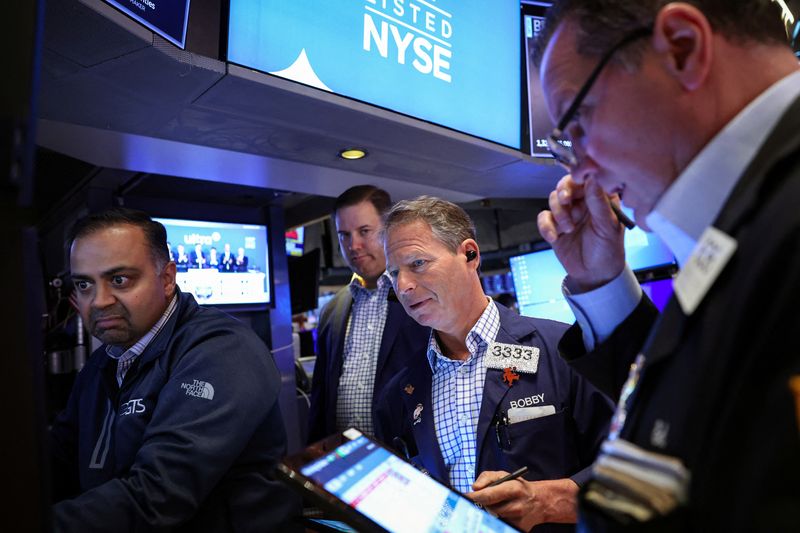By Sinéad Carew and Medha Singh
(Reuters) -MSCI's global equities index edged lower and the dollar slipped with Treasury yields on Wednesday as investors digested the latest economic data and the potential impact of policies from the incoming U.S. administration, including tariff threats.
Oil prices settled close to flat after a large, surprise build in U.S. gasoline stockpiles and worries about the outlook for U.S. interest rates in 2025 countered easing supply concerns from a ceasefire deal between Israel and Hezbollah.
Equities lost some ground after data showed U.S. consumer spending increased solidly in October, suggesting the economy kept a strong growth pace but progress dampening inflation has stalled recently. In the 12 months through October core inflation, which the Federal Reserve tracks for monetary policy, increased 2.8% after climbing 2.7% in September.
"This was no earth-shattering news for the markets. We all expected that inflation would pop up a little bit, but inflation is not getting out of hand. And that's the key,” said Peter Cardillo, chief market economist at Spartan Capital Securities. "This paves the way for a 25 basis point cut in December and then probably a pause."
After the data, traders were betting on a 70% probability for a Fed rate cut in December compared with a roughly 59% probability on Tuesday, according to CME Group's (NASDAQ:CME) FedWatch tool.
On Wall Street, the Dow Jones Industrial Average fell 138.25 points, or 0.31%, to 44,722.06, the S&P 500 fell 22.89 points, or 0.38%, to 5,998.74 and the Nasdaq Composite fell 115.10 points, or 0.60%, to 19,060.48.
MSCI's gauge of stocks across the globe fell 0.84 points, or 0.10%, to 858.24, while Europe's STOXX 600 index closed down 0.19% earlier in the day.
Investor reactions to the data took into account President-elect Donald Trump's late Monday threat to immediately put a 25% tariff on all products from Mexico and Canada when he takes office in January, and impose an additional 10% tariff on goods from China. The threat already drew warnings of retaliation.
"Today’s data shouldn’t change views of the likely path for disinflation, however bumpy. But a lot of observers, probably including some at the Fed, are looking for reasons to get more hawkish on the outlook given the potential for inflationary policy change like new tariffs,” said David Alcaly, lead macroeconomic strategist at Lazard Asset Management in an email.
Wednesday's market moves were likely magnified by lower liquidity before Thursday's U.S. Thanksgiving holiday, according to Alex Atanasiu, portfolio manager at Glenmede Investment Management. Thursday's market close will be followed by a shorter trading day on Friday.
In Treasuries, the yield on benchmark U.S. 10-year notes fell 5.4 basis points to 4.248%, from 4.302% late on Tuesday while the 30-year bond yield fell 5 basis points to 4.4298% from 4.48% late on Tuesday.
The two-year note yield fell 3.1 basis points to 4.223%, from 4.254% late on Tuesday.
In currencies, the dollar index, which measures the greenback against a basket of currencies including the yen and the euro, fell 0.73% to 106.06.
Against the Japanese yen
151.11 with the yen touching its strongest level versus the greenback in five weeks.
The euro was up 0.75% at $1.0565 while sterling strengthened 0.85% to $1.2675.
After falling on Tuesday, the Mexican peso strengthened 0.3% versus the dollar, and the Canadian dollar strengthened 0.21% against the greenback.
The largest cryptocurrency, bitcoin, attempted to find its feet after a four-day retreat from a record high of $99,830. It was last up 5.34% at $96,544.00.
Oil prices flitted between red and green having fallen on Tuesday on confirmation of the Israel-Hezbollah ceasefire after selling off more sharply on Monday in anticipation of such an agreement.

U.S. crude settled down 0.07% at $68.72 a barrel, while Brent ended at $72.83 per barrel, up 0.03% on the day.
In precious metals, spot gold rose 0.17% to $2,636.35 an ounce. U.S. gold futures rose 0.61% to $2,637.20 an ounce.
